Classic Commentaries and Studies on Romans (32 vols.)
Digital Logos Edition
Overview
Thirty-two volumes make up this engaging collection on the book of Romans. Arguably the most doctrinally rich Pauline epistle, Romans is discussed by an astonishing 28 theologians and biblical scholars in this collection of commentaries and studies. Infused with insight, wisdom, and critical exegesis, Classic Commentaries and Studies on Romans (32 Vols.) will prove to be invaluable for pastors, professors, Sunday school teachers, students, and laity. Written at a time of new archaeological discoveries and new ways of understanding the biblical text, these books are cited in major commentaries on Romans written today. All who read the words from these theological writers will come away with a greater understanding of the doctrinal truths and practical instruction found in Romans.
Over 14,000 pages of instruction and application make up this remarkable collection, composed of commentary from scholarly greats such as H. P. Liddon, E. Purdue, and Thomas Robinson. The collection demonstrates a comprehensive spectrum of interpretation of Romans, and includes outlines, verse-by-verse exegesis, historical facts, doctrinal truths, word studies, commentaries, and study notes.
Using the electronic format of these resources will save you hours of paging through books. In Logos Bible Software, you can search theological topics and complete original languages studies with the click of a mouse, making Classic Commentaries and Studies on Romans (32 Vols.) more accessible than ever. Your favorite Romans commentaries will also show up in your Passage Guide searches.

- Biblical knowledge from dozens of learned theologians
- 32 commentaries and studies on the book of Romans
- Over 14,000 pages of insight into the doctrine of one of Paul's greatest epistles
- Title: Classic Commentaries and Studies on Romans
- Volumes: 32
- Pages: 13,704
This title is included in the following collections
You can save when you purchase this product as part of a collection.
The Romans Collection (125 vol...
$1,943.10$999.99Logos 7 Reformed Diamond Legac...
$2,999.99$2,999.99Logos 7 Reformed Portfolio Leg...
$4,749.99$4,749.99Logos 8 Collector's Edition Le...
$11,399.99$11,399.99
- $11,399.99
- $21,749.99
- $24,999.99
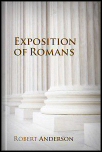
Deviations from the truth of the gospel are more than a rare occurrence. Out of his own growing concern over the matter, Robert Anderson created a set of lectures with the aim of preaching solid biblical truth from the book of Romans. A Practical Exposition of St. Paul’s Epistle to the Romans is the culmination of talks Anderson gave as he preached straight through Romans during a lecture series at Trinity Chapel in Brighton.
Robert Anderson, curate of Trinity Chapel in Brightain, was also chaplain to the Lord Hill and Lord Teinmouth. The biblical studies of this nineteenth-century theologian are insightful and lucid.
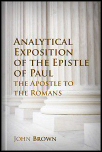
John Brown spent more than 40 years studying the book of Romans before writing this resource. Brown’s compelling exegesis focuses extensively on the doctrine of justification as he dissects the complete book of Romans.
John Brown was the senior minister of the United Presbyterian Congregation in Edinburgh. Also a professor of exegetical theology to the United Presbyterian Church, he lived in the 1800s.
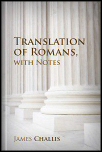
First published in Scholz’s 1836 edition of the New Testament, James Challis‘ Translation of Romans, with Notes was republished independently with a few small revisions in the year 1871. Challis’ commentary is filled with practical implementations and discussion of his ideas of biblical interpretation as he delves into the doctrine of Romans.
James Challis (1803–1882), an English astronomer, was also an avid theologian, physicist, and clergyman. A Translation of the Epistle of the Apostle Paul to the Romans was one of two theological dissertations written by him.
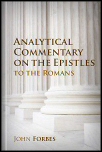
Forbes, noticing that most commentaries of his day were quite detailed and could be laborious to wade through, penned his Analytical Commentary on the Epistles to the Romans with the intent of giving biblical scholars a broad, sweeping overview of the structure, transitions, and main points of Romans. His clear outline of this Pauline epistle will benefit all who read it.
John Forbes was a Scottish theologian and minister.
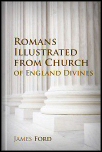
Romans has been described by James Ford as “a key to the right understanding of the other epistles” and “a perfect catechism of the Church.” Expounding upon the important role Romans plays as a part of the Pauline epistles, Ford’s compendium on the subject is compelling and informative.
James Ford, MA, was the prebendary of Exeter Cathedral, England, during the nineteenth century.
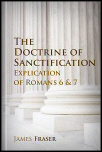
Romans covers a wide spectrum of highly important theological topics, and the subject honed in upon by James Fraser can be found in chapters 6 and 7. Following a detailed account of his life written by John Erskine, Fraser expounds upon the doctrinal significance of sanctification.
James Fraser, the son of a Scottish clergyman also named James Fraser, moved to London to become a preacher. Experiencing religious persecution in Scotland, he was captured, imprisoned, and eventually sent across the ocean to New England. Settling in Connecticut upon his release, he once again became a preacher, where he died in 1769.
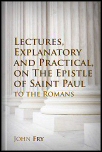
Although all Scripture is God-breathed, John Fry believes that some texts are more significant than others. To him, the book of Romans is among the more important New Testament epistles. This critical exegesis systematically discusses all 15 chapters of Romans, laying out the doctrine this great book contains in an accessible manner.
John Fry (1775–1849), a graduate of University College in Oxford, went on to become the rector of Desford in Leisestershire. Having written quite a few books himself, he was also the brother of another well-known theological writer, Caroline Fry.
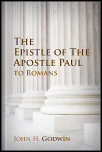
The Epistle of the Apostle Paul to Romans, divided into seven parts, is Professor John Godwin’s vigorous effort to explain the book of Romans as simply and accurately as possible. His design was to add and take away nothing from the text, but instead to discuss clearly the doctrine Paul outlined in this letter to the Romans.
John H. Godwin was a professor of New College, London, in the nineteenth century.
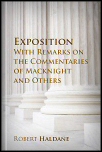
Dividing Romans into two sections, chapter 1 through the beginning of 12 and then the rest of twelve through the end of the book, Robert Haldane provides a detailed look at the doctrinal importance of this book. Included in Haldane’s extensive exegesis are notes on commentaries by other well-known theologians.
Robert Haldane (1764–1842) was born in London. During the earlier years of his life, he was in the Royal Navy, after which he became a traveling preacher around the country of Scotland. Haldane was a participant in the revival of Protestant Christianity across Europe, and he wrote several pamphlets and articles, among them his Exposition of the Epistle to the Romans; with Remarks on the Commentaries of Dr. MacKnight, Professor Moses Stuart, and Professor Tholuck.
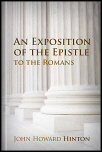
An Exposition of the Epistle to the Romans includes an introduction, an appendix, and a section entitled “the scheme of the epistles.” Hinton's exegetical commentary on Romans is remarkable and thorough.
John Howard Hinton was born in 1791. An English Baptist minister, he died in 1873.
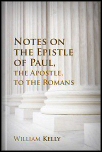
Broken into 13 sections, William Kelly’s notes on Romans are the result of years of study on the topic. He concisely journeys through each chapter of Romans, delving into doctrinal truths and practical biblical wisdom.
William Kelly (1821–1906), born in Ireland, moved to London after attending Trinity College in Dublin. Becoming highly involved with the Plymouth Brethren, he also became a prolific writer, earning the respect of theologians such as Henry Alford. He is quoted as having said “There are three things real—the Cross, the enmity of the world, the love of God.”
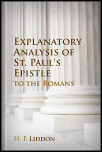
Explanatory Analysis of St. Paul’s Epistle to the Romans was written for students attending a lecture series entitled “Author’s Lectures,” during the years of 1875 to 1876. Intended as an outline and study guide, the words of Liddon on the great book of Romans are sure to inspire, challenge, and encourage all.
H. P. Liddon was one of the nineteenth century’s most influential theologians. Born in England in 1829, he studied at King’s College and Oxford, then became canon of St. Paul’s Cathedral in London, where thousands listened to him preach every Sunday. Accepting the position of Professor of the Exegesis of Holy Scripture at Oxford, he taught there until retirement, at which time he traveled extensively, on occasion with his good friend Lewis Carroll. Liddon died in 1890.
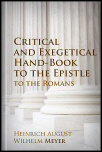
Originally written in German, Heinrich August Wilhelm Meyer’s study on Romans contains the original preface from the German edition, as well as a preface specifically written by the author for the English edition. A helpful index of resources entitled “Exegetical Literature of the Epistle” is included in this resource, totaling nine pages. Meyer’s notes on Romans are informative and thorough, and include Greek word studies.
Heinrich August Wilhelm Meyer was born in 1800 in Gotha, Germany. A Protestant, he is well-known for his theological writings. He died in 1873.
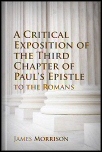
Believing the third chapter of Romans to be of particular note and significance, James Morrison takes the time to thoroughly dissect this text. He provides the original Greek translation as well as the English Authorized Version and a version translated by the author himself. Delving into Romans, Morrison provides a thought-provoking and thorough verse-by-verse commentary.
James Morrison, a nineteenth century British theologian, is the author of A Critical Exposition of the Third Chapter of Paul’s Epistle to the Romans.
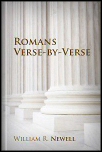
Romans Verse-by-verse
- Author: William R. Newell
- Publisher: Moody Press
- Publication Date: 1938
- Pages: 410
Clear and informative, this commentary on Romans written by William Newell contains many helpful footnotes to supplement the over 400 pages of insight Newell’s book holds.
William R. Newell (1868–1956) has written studies on Romans, Galatians, Hebrews, Revelation, and parts of the Old Testament, as well as a handful of other resources. Many have gained insight from his writings over the years.
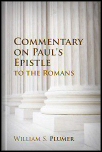
Beginning with an account of Paul’s life, William S. Plumer’s dissertation is a historically rich study guide to Romans and the context in which this Pauline epistle fits into the scope of the Scriptures.
William S. Plumer is well-known for his theological writings, including Studies in the Book of Psalms, The Law of God, The Grace of Christ, Vital Godliness, Jehovah-Jireh, and The Rock of Our Salvation.
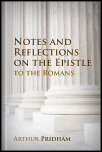
Dividing the book of Romans into three sections—theological, dispensational, and practical—Arthur Pridham discusses each in a thought-provoking manner. This commentary is astute and comprehensive.
Arthur Pridham is a nineteenth century theologian and writer, also well-known for penning Notes and Reflections on the Psalms.
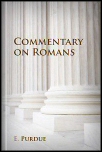
Covering the entirety of the book of Romans, Edward Purdue does so in just over 200 pages. Though incredibly concise, this resource holds much theological insight.
Reverend Edward Purdue, Master of the Endowed School in Kinsdale, was a great theological writer from the 1800s.
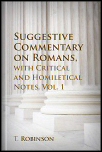
Robinson’s Suggestive Commentary on Romans, with Critical and Homiletical Notes (2 Vols.) was written with the aim of giving aid to professors, biblical scholars, and Sunday school teachers—anyone teaching the Bible in any capacity and in need of a concise study of one of the New Testament’s most doctrinally important books.
Thomas Robinson, whose other noted works include The Evangelists and the Mishna, is one of the nineteenth century’s finest scholars.
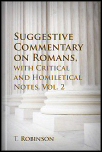
Continuing where the first volume of Suggestive Commentary on Romans, with Critical and Homiletical Notes left off, volume 2 follows the same vein of lucid instruction on Paul’s epistle to the Romans.
Thomas Robinson, whose other noted works include The Evangelists and the Mishna, is one of the nineteenth century’s finest scholars.
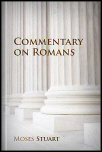
Moses Stuart’s commentary on Romans, containing over 500 pages of insight, is helpful for anybody hoping to become well-acquainted with the complexities of this highly important doctrinal epistle.
Moses Stuart, born in 1780, was a Connecticut native. A Yale graduate, he went on to teach Hebrew and Oriental languages at Harvard. A prolific author, he died in 1852.
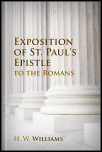
Intended by Henry W. Williams as a guide for the biblical scholar, Exposition of St. Paul's Epistle to the Romans is richly infused with doctrinal truth and cross-references from other New Testament books. Williams’ dissertation on Romans is the result of many years of study.
Henry W. Williams, nineteenth century theologian and pastor, is also the author of The Incarnate Son of God, as well as Union with Christ.
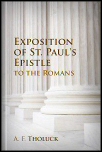
Exposition of St. Paul's Epistle to the Romans was originally published in German in 1836. This focused work contains the original German preface, as well as one written for the English edition. An extensive introduction with a historical analysis of the context, culture, and writing of Romans precedes Tholuck’s commentary, which travels verse by verse through the epistle.
A. F. Tholuck was a Professor of Theology in the Royal University of Halle, as well as a member of the Asiatic Society of London. He lived during the nineteenth century.
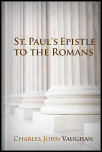
The third edition of St. Paul's Epistle to the Romans, Charles John Vaughan's focused book is comprised of a sermon excerpt entitled “On St. Paul's Conversion and Doctrine,” as well as an extensive commentary of the original Greek biblical text.
Charles John Vaughan, who was Master of the Temple during his lifetime, lived in the 1800s.
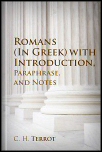
C. H. Terrot’s study on Romans is rich with original Greek text and English paraphrase, and also contains an extensive introduction, outlining this well-loved and much-studied Pauline epistle.
C. H. Terrot, a fellow of Trinity College at Cambridge, was a biblical scholar from the nineteenth century.
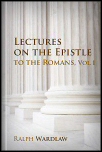
Lectures on the Epistle to the Romans (3 Vols.) was edited by Ralph Wardlaw’s son, J. S. Wardlaw. This collection is a compilation of dozens of lectures Wardlaw preached on the subject. His astute exegesis is thought-provoking and comprehensive, each lecture covering sequential biblical text as he worked his way through the text of Romans.
Ralph Wardlaw was a nineteenth century biblical scholar and pastor.
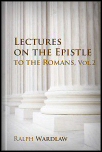
Volume two of Wardlaw’s set picks up where the first volume left off, with a sermon beginning at verse 12 of chapter 5. This volume ends with sermons in chapter 10 of Romans.
Ralph Wardlaw was a nineteenth century biblical scholar and pastor.
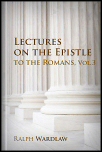
The third volume in this posthumously published set continues with the study of Romans, in a concise elucidation of thought by theologian Ralph Wardlaw.
Ralph Wardlaw was a nineteenth century biblical scholar and pastor.
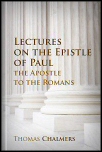
One may have eyes to see, but if the world around oneself is dark, clear sight is still prohibited. To reverse the scenario, the entire world may be illuminated, but if one’s eyesight is bad, one will not see. Thomas Chalmers introduces us to the book of Romans with that analogy, providing over 500 pages of profound insight into this doctrinally rich book of the Bible. His untitled lectures work their way sequentially through the book of Romans.
Thomas Chalmers (1780-1847), a Scottish mathematician, was also a theologian and pastor who later became a leader of the Free Church of Scotland. He was also very involved with the educational system and as an advocate for the poor. Chalmers wrote many theological resources during his lifetime.
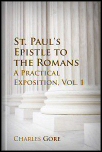
Charles Gore realized that many theological dissertations on the book of Romans were inaccessible to those who were not Bible scholars. Wishing to remedy that, he wrote St. Paul’s Epistle to the Romans: A Practical Exposition (2 vols.). This resource is a remarkably concise compendium, rich with biblical references and perfect for laity.
Charles Gore (1853-1932) studied at Oxford and was subsequently elected as a fellow of Trinity College at Oxford. Writer of over a dozen theological books, he was also the vicar of Radley, canon of Westminster, and later, bishop of Oxford. Gore helped found the Christian Social Union.
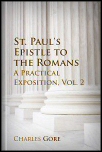
Continuing where volume 1 left off, volume 2 of Charles Gore’s exposition on Romans begins by delving into chapter 9. Appended notes end the collection, including an essay on the meaning of the word “faith,” usage of the word “conscience,” and a dissertation on the subject of baptism.
Charles Gore (1853-1932) studied at Oxford and was subsequently elected as a fellow of Trinity College at Oxford. Writer of over a dozen theological books, he was also the vicar of Radley, canon of Westminster, and later, bishop of Oxford. Gore helped found the Christian Social Union.
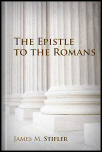
Published in 1897, The Epistle to the Romans is a meticulous study of the entire book of Romans, written by nineteenth century theologian James Madison Stifler.
James Madison Stifler, American-born theologian, was a Professor of New Testament Exegesis in Crozer Theological Seminary in Chester, Pennsylvania. He lived during the nineteenth century.
Reviews
13 ratings

Forrest Cole
11/9/2021

Kevin Bratcher
6/12/2018

Faithlife User
5/25/2017

M. David Johnson
3/27/2015
AeliusCicero
4/15/2014

Faithlife User
2/25/2014

Larry Proffitt (I
11/13/2013

Caleb Allen
10/12/2013
Eduardo Vega
9/25/2013

RevSarge
8/5/2013